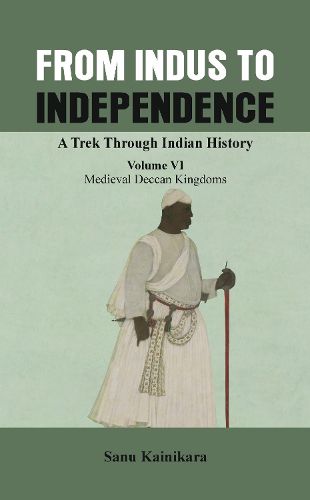Readings Newsletter
Become a Readings Member to make your shopping experience even easier.
Sign in or sign up for free!
You’re not far away from qualifying for FREE standard shipping within Australia
You’ve qualified for FREE standard shipping within Australia
The cart is loading…






This title is printed to order. This book may have been self-published. If so, we cannot guarantee the quality of the content. In the main most books will have gone through the editing process however some may not. We therefore suggest that you be aware of this before ordering this book. If in doubt check either the author or publisher’s details as we are unable to accept any returns unless they are faulty. Please contact us if you have any questions.
This is the sixth volume of the series on Indian history, From Indus to Independence: A Trek through Indian History, and deals with the Islamic entrenchment in the Deccan Plateau-the flow of events, the reasons and the consequences of this development. It starts with an overview of the Deccan and provides a detailed and contextual background of South India before the Islamic invasion. It also explains the spirited Hindu revival that took place before the entire Deccan was subsumed by the Islamic enterprise emanating from North India. The core subject of study in the book is the medieval kingdoms of the Deccan, the Bahmanis and its successor Shahi kingdoms. The history of the Bahmani dynasty; its tumultuous founding; the rule of various kings; and a detailed analysis of the breakup of the kingdom-the process, reasons and aftermath-has been analysed and described. Subsequently the three major successor dynasties-Adil Shahis, Nizam Shahis and Qutb Shahis-are studied in great detail and narrated as three separate sections. The book carries out an assessment of the nearly four centuries of Islamic rule in medieval Deccan, detailing the troubles and tribulations that made these dynasties less effective than they could have been and the incessant in-fighting that made the successor Shahi kingdoms fragile and open to easy conquest in their later days by the Mughals. The book also studies the cultural, literary, architectural and religious aspects that stand out in the Deccan as a consequence of the mingling of Islam and Hinduism, which created unique outcomes.
$9.00 standard shipping within Australia
FREE standard shipping within Australia for orders over $100.00
Express & International shipping calculated at checkout
This title is printed to order. This book may have been self-published. If so, we cannot guarantee the quality of the content. In the main most books will have gone through the editing process however some may not. We therefore suggest that you be aware of this before ordering this book. If in doubt check either the author or publisher’s details as we are unable to accept any returns unless they are faulty. Please contact us if you have any questions.
This is the sixth volume of the series on Indian history, From Indus to Independence: A Trek through Indian History, and deals with the Islamic entrenchment in the Deccan Plateau-the flow of events, the reasons and the consequences of this development. It starts with an overview of the Deccan and provides a detailed and contextual background of South India before the Islamic invasion. It also explains the spirited Hindu revival that took place before the entire Deccan was subsumed by the Islamic enterprise emanating from North India. The core subject of study in the book is the medieval kingdoms of the Deccan, the Bahmanis and its successor Shahi kingdoms. The history of the Bahmani dynasty; its tumultuous founding; the rule of various kings; and a detailed analysis of the breakup of the kingdom-the process, reasons and aftermath-has been analysed and described. Subsequently the three major successor dynasties-Adil Shahis, Nizam Shahis and Qutb Shahis-are studied in great detail and narrated as three separate sections. The book carries out an assessment of the nearly four centuries of Islamic rule in medieval Deccan, detailing the troubles and tribulations that made these dynasties less effective than they could have been and the incessant in-fighting that made the successor Shahi kingdoms fragile and open to easy conquest in their later days by the Mughals. The book also studies the cultural, literary, architectural and religious aspects that stand out in the Deccan as a consequence of the mingling of Islam and Hinduism, which created unique outcomes.